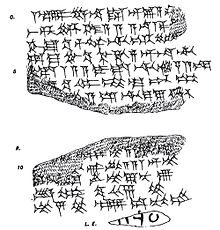| Nabû-mukin-zēri | |
|---|---|
| King of Babylon | |
 Text dated to Nabû-mukin-zēri's 4th year[i 1] | |
| Reign | 731–729 BC |
| Predecessor | Nabû-šuma-ukîn II |
| Successor | Tukultī-apil-Ešarra III |
| House | Dynasty of E |
Nabû-mukin-zēri, inscribed mdAG-DU-NUMUN,[i 1] also known as Mukin-zēri,[i 2] was the king of Babylon 731–729 BC. The Ptolemaic Canon gives his name as Χινζηρος. His reign was brought to its eventual end by the capture of the stronghold of Šapia by the forces of the Assyrian king Tukultī-apil-Ešarra III (745–727 BC). The chief of the Chaldean Amukanu tribe in southern Babylonia, he took advantage of the instability which attended the revolt against Nabû-nādin-zēri and deposed its leader, Nabû-šuma-ukîn II.
Cite error: There are <ref group=i> tags on this page, but the references will not show without a {{reflist|group=i}} template (see the help page).